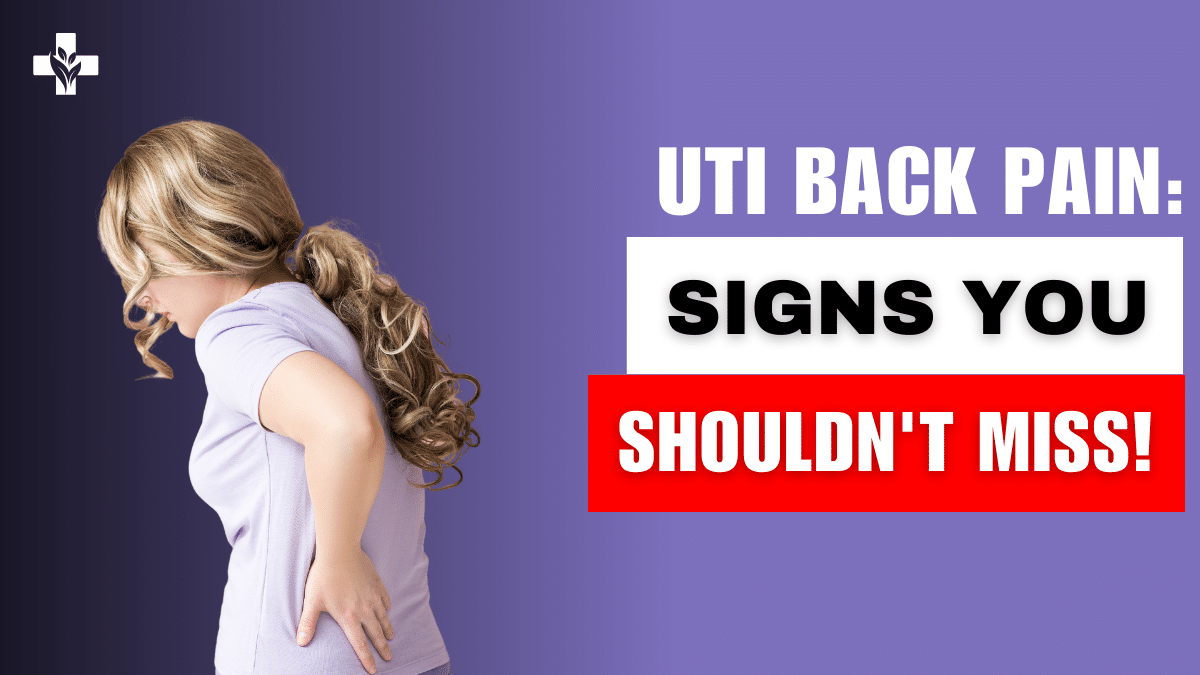Stop Ignoring UTI Back Pain: Here’s Why It Matters!
A typical Urinary Tract Infection (UTI) primarily affects the bladder and urethra, causing discomfort localized to the pelvic area. However, if left untreated, a UTI can progress to the kidney, which may cause back pain.
While a simple UTI typically does not directly lead to lower back pain, it’s important to recognize kidney infection symptoms, such as fever and flank pain.
This article will look into the connection between UTIs and back pain, discussing causes and treatment options, so read on.
Can UTIs cause back pain?
Yes, UTIs can cause back pain. When bacteria travel up the urinary tract, they can reach the kidneys, leading to inflammation and discomfort in the flank area (sides of the lower back).
This can be a warning sign of a more serious complication: a kidney infection known as Pyelonephritis. In Pyelonephritis, bacteria infect the kidneys, causing various symptoms, including lower back pain. The kidneys, located just below the ribcage at the back, are particularly vulnerable to infection when bacteria reach this area.
Therefore, if you experience persistent or severe back pain along with symptoms like nausea and fever, it could indicate that the UTI has progressed to a kidney infection.
Characteristics of back pain UTI

UTI back pain often presents alongside additional characteristics. Here’s what you should know:
- Location: The pain is typically observed in the lower back, just above the waistline. It may radiate to the sides or lower abdomen due to the location of the kidney
- Type of pain: It is often described as a dull, aching discomfort. It may feel like a constant, nagging ache in the lower back
- Severity: The intensity of UTI-related back pain can vary from mild to moderate. In some cases, it can be quite uncomfortable but is usually not as severe as kidney pain caused by conditions like kidney stones
- Accompanying UTI symptoms: It is typically accompanied by other symptoms. This includes a frequent urge to urinate, high temperature, shivering, fatigue, loss of appetite, and diarrhea
Also Read: We have a comprehensive article on the management of UTI. Read: “How Much Water to Flush Out UTI? UTI Management Essentials” to know more about essential tips for treating and preventing UTIs
Treatment of UTI and back pain
Treating the infection is key to relieving UTI-related back pain and preventing complications. Timely treatment helps address the root cause and eases discomfort. So, it’s important to see a doctor promptly and follow treatment instructions to manage UTIs effectively and avoid problems. Common approaches to treating UTI-related back pain:
Antibiotics
Kidney infections are treated with a course of antibiotics prescribed by a healthcare provider, such as Augmentin (Augmentin 375 mg), Amoxicillin, or Trimethoprim-sulfamethoxazole (TMP-SMX). These medications help eliminate the underlying bacterial infection and alleviate associated symptoms, including back pain.
Pain management
Over-the-counter pain relievers, like Ibuprofen (Brufen 400mg) or Acetaminophen, help in managing the discomfort associated with UTI-related back pain.
Hydration
Drinking plenty of water flushes out the harmful bacteria from the urinary tract and may alleviate symptoms. Staying well-hydrated is crucial during UTI treatment.
Rest
Resting and avoiding strenuous activities can help your body recover quickly from the infection, as kidney infections can be physically draining.
Also read: For a closer look at UTI treatment options, check out our article: “Exploring Alternative Approaches: Effective UTI Treatment Without Antibiotics”
Conclusion
When a UTI spreads to the kidneys, it causes a kidney infection known as Pyelonephritis, a serious medical condition associated with lower back pain.
Recognizing the characteristics of UTI-related back pain—such as its location, type, severity, and accompanying UTI symptoms—is essential for proper diagnosis and timely treatment. UTIs should not be taken lightly, as they can lead to severe complications if left untreated.
Treatment for UTI back pain primarily involves antibiotics to eliminate the underlying infection. Other treatment options include pain management with over-the-counter medications, staying well-hydrated, and allowing your body to rest and recover.
It’s important to seek timely medical attention to prevent the UTI infection from advancing to the kidneys and leading to lower back pain. Early intervention can help prevent the infection from progressing and promote a quicker recovery. If you suspect a UTI or experience back pain along with other urinary symptoms, it’s important to consult a healthcare professional for accurate evaluation and appropriate treatment.
Frequently Asked Questions
Where does your back hurt with a UTI?
Is back pain with a UTI serious?
How can I tell if my back pain is kidney-related?
How fast can a UTI go to the kidneys?
Can a UTI spread to your spine?
WowRx uses only high-quality sources while writing our articles. Please read our content information policy to know more about how we keep our content reliable and trustworthy.






